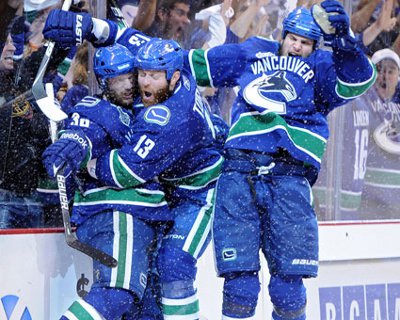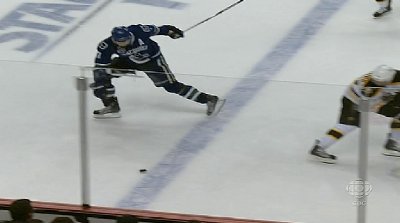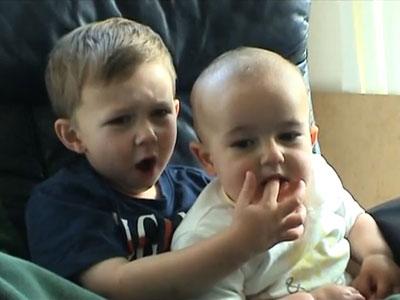 1. After an obscenely long eight-day wait, the Vancouver Canucks finally opened the Stanley Cup Final against the Boston Bruins with a dramatic last-minute victory in game one at Rogers Arena. This game had everything you could ask for, unless you’re a Bruins fan: a torrid pace to open the game, huge hits, spectacular goaltending, controversy (in the form of an alleged biting incident) and a great goal by Raffi Torres to win the game with 19 seconds remaining on the clock. Chances at both ends, blinding speed, hits galore… Stupendous penalty killing, spectacular goaltending, excellent emotion from both teams… Ed Willes at the Province called it “a dull, grinding affair”, only proving how out of touch sports writers tend to be. Don’t believe what you read, folks. And you, Mr Willes? If you’d rather watch Pass it to Bulis play Scrabble with Tanner Glass, then give your cushy press box seat to someone who enjoys hockey at its finest. Like me, you sour bastard.2. It’s the type of goal the Canucks aren’t known for. Historically – and even as recently as round one of these playoffs – it’s been the Canucks allowing last-minute heroics, not creating them. Think back to the regular season. Remember how long it took Cory Schneider to get his first clean sheet? Vancouver was renowned for giving up the late one to spoil goose eggs. We at Pucked in the Head are proud of our accurate stats: the Canucks gave up eleventy billion goals in the last three minutes of otherwise scoreless periods. Luongo, he of the $10-million contract, had to invent a story that shutouts were overrated, anyway.
1. After an obscenely long eight-day wait, the Vancouver Canucks finally opened the Stanley Cup Final against the Boston Bruins with a dramatic last-minute victory in game one at Rogers Arena. This game had everything you could ask for, unless you’re a Bruins fan: a torrid pace to open the game, huge hits, spectacular goaltending, controversy (in the form of an alleged biting incident) and a great goal by Raffi Torres to win the game with 19 seconds remaining on the clock. Chances at both ends, blinding speed, hits galore… Stupendous penalty killing, spectacular goaltending, excellent emotion from both teams… Ed Willes at the Province called it “a dull, grinding affair”, only proving how out of touch sports writers tend to be. Don’t believe what you read, folks. And you, Mr Willes? If you’d rather watch Pass it to Bulis play Scrabble with Tanner Glass, then give your cushy press box seat to someone who enjoys hockey at its finest. Like me, you sour bastard.2. It’s the type of goal the Canucks aren’t known for. Historically – and even as recently as round one of these playoffs – it’s been the Canucks allowing last-minute heroics, not creating them. Think back to the regular season. Remember how long it took Cory Schneider to get his first clean sheet? Vancouver was renowned for giving up the late one to spoil goose eggs. We at Pucked in the Head are proud of our accurate stats: the Canucks gave up eleventy billion goals in the last three minutes of otherwise scoreless periods. Luongo, he of the $10-million contract, had to invent a story that shutouts were overrated, anyway.
The regular season is meaningless in the post-season, you say? Howzabout Harold Snepsts gifting Mike Bossy with two seconds left in the first OT of the 1982 final? You want recent history instead? Then think back to the Chicago series; I’m sure we all remember Jonathan Toews scoring – shorthanded, mind you – with just a few ticks left on the clock to send game seven to overtime. But these days the skate is on the other foot. The Western Conference Finals saw Ryan Kesler deflect a Henrik Sedin shot with thirteen seconds to play and send game five to extra time. Fast forward to the final moments of game one of the finals, and the Canucks once more snag a late one, turning what almost certainly would have been double or triple overtime into a 1-0 regulation win. Can it be that the Canucks are finally learning the lessons that years of playoff disappointment have been trying to pound into them? Have the lads at long, long last taken to heart the idea that sitting back and waiting for something good almost always leads to something bad?
The Canucks have consistently been outlasting opponents as games go on, carrying play in third periods and – it seems strange to say this in June – winning playoff hockey games because of it. They’ve been rewarded with nine wins in their last twelve games.
 3. Bruins fans were growling, knocking over garbage cans and getting zapped by electric fences – or whatever the hell bears do when they’re whining – because they felt Wednesday’s winning goal should have been whistled for offside. Well, here is photographic proof that it wasn’t. Ryan Kesler made a great play to flip the puck past the defender, and as you can see, managed to just drag his toe to remain onside. Ten years from now, looking back on this Canucks playoff run, it’s the kind of essential detail that will be completely overlooked – the same way Jeff Brown’s superb pass to spring Bure is overshadowed by the Russian Rocket’s ensuing deke – yet without The Toe Drag (TM), Hansen doesn’t get the puck, and Torres doesn’t get the tap-in. Nice work, SuperKes.
3. Bruins fans were growling, knocking over garbage cans and getting zapped by electric fences – or whatever the hell bears do when they’re whining – because they felt Wednesday’s winning goal should have been whistled for offside. Well, here is photographic proof that it wasn’t. Ryan Kesler made a great play to flip the puck past the defender, and as you can see, managed to just drag his toe to remain onside. Ten years from now, looking back on this Canucks playoff run, it’s the kind of essential detail that will be completely overlooked – the same way Jeff Brown’s superb pass to spring Bure is overshadowed by the Russian Rocket’s ensuing deke – yet without The Toe Drag (TM), Hansen doesn’t get the puck, and Torres doesn’t get the tap-in. Nice work, SuperKes.
4. Speaking of controversial decisions, Patrice Bergeron was reportedly crying foul in the post-game scrum, waving about a newly sharpened hook where his hand used to be. Look, I know biting has no place in hockey, but anybody suggesting that Alex Burrows should be suspended for the alleged bite should consider the following: first, go find a well-used hockey glove and smell it… No really, go ahead, I’ll wait. Got one? Now, imagine having that rammed down your gullet. What’s your reaction? An involuntary twist away, while trying to close your mouth & prevent further gullet rammage, right? That’s what I thought.

In this fan’s opinion, there should be mandatory suspensions for anyone who places their hockey gear in another player’s mouth. Who does that, I ask you? Who? I’m sure Mike Murphy sat at the league office feeling like he was breaking up a fight during elementary school recess: “What happened? Alex? Did you bite Patrice’s glove? Okay, biting is bad. Bad, Alex. Now, Patrice, how did your glove get in his mouth? You see? No one likes a tattle tale, Pat. Suck it up. That finger pointing is exactly what got you into this trouble.”
5. I said yesterday that I hoped we wouldn’t see repeats of the poor officiating that marred the conference finals. For the most part, I was happy. While the flow of the game was destroyed early on by a parade to the penalty box, there were really no calls that the officials could have or should have passed on. Sure, I wouldn’t mind a little consistency on the definition of a cross check; it seems that if one cross check to a prone Dan Hamhuis warrants a penalty, nine cross checks to the back of a standing Daniel Sedin should at least warrant a stern talking to. I’d also like to see some mathematical models of how Alex Burrows getting pushed into the back of Tim Thomas’s leg caused Thomas to be launched into orbit (we’ll let slide for now the medical miracle of Thomas surviving atmospheric re-entry unscathed). Overall, the officials did the best job they could in the (very undisciplined) first two periods. Think there were too many penalties, as my co-host Jason tweeted incessantly? This time, the blame lies upon the players.
 6. For the third time in four tries this post-season, Roberto Luongo got a shutout in game one of a playoff series. How anyone still doubts this guy is a mystery that deserves its own A&E miniseries. Okay, few of Lou’s thirty-six saves were of the spectacular variety. But the Bruins had a tonne of quality scoring chances – Luongo’s positioning is just so consistently solid that when he’s on his game, he makes everything look easy.
6. For the third time in four tries this post-season, Roberto Luongo got a shutout in game one of a playoff series. How anyone still doubts this guy is a mystery that deserves its own A&E miniseries. Okay, few of Lou’s thirty-six saves were of the spectacular variety. But the Bruins had a tonne of quality scoring chances – Luongo’s positioning is just so consistently solid that when he’s on his game, he makes everything look easy.
At the other end of the ice, Tim Thomas was equally impressive. This game could easily have been over in the first minute or two as the Canucks came out flying, and tested Thomas with three tough deflections. He faced thirty-three shots and, but for a combination of great puck movement from the Canucks and a single bad line change from the Bruins, would have gotten the game into overtime. If Boston manages to win this series, there will be no question as to the Conn Smythe winner. There is an old adage that great goaltending guarantees a great game. That was certainly true Wednesday night. If both goalies maintain their form, this series will be one for the ages. Not for the aged, mind you, as Don Cherry and the aforementioned Ed Willes attest. For the ages.
7. If Canucks fans weren’t flying high enough already, we leave you with some encouraging statistics. The team that wins game one of a playoff series wins 68.3% of the time. Narrowing it down a little more, when the home team wins the first game of the Stanley Cup Final, their record is 44-7. In other words, if history is any indicator, the Canucks have gone from a 38% chance of winning the cup when the playoffs started – the historical likelihood that the Presidents Trophy winner would go the distance – to an 86.3% chance as a home team winning the opening game. And finally, with his game one shutout, Roberto Luongo joined an elite group of modern era goalies that have opened a cup final series with a shutout. The five before him – Chris Osgood, Martin Brodeur, Patrick Roy, Grant Fuhr and Billy Smith – all led their team to the promised land. Even if you’re a curmudgeon like me, and you’re still waiting for that other shoe to drop on the Canucks season, you have to recognize that time is getting very short and the Vancouver Canucks are right on the cusp. As of today, the Vancouver Canucks need only play .500 hockey to claim their first ever Stanley Cup.
